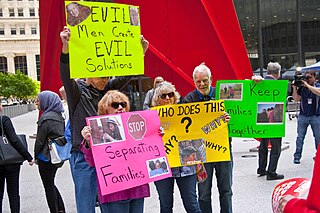
Note from Kathie MM: As too often happens, a major human rights issue has become a political football, human beings are suffering, and important evidence about the outcomes of yet another instance of some people’s inhumanity to others is being ignored. But Dr. Alice LoCicero has some insights to share.
by Alice LoCicero
It is hard for me to believe that while the vast majority of Americans are disturbed by the sight of immigrant parents and children being summarily separated, and babies being remanded to group care, some Americans are not. Yesterday, results of a Quinnipiac poll showed although 66% of Americans reject the policy, 27 % favor it.
The policy has been called child abuse, torture, inhumane. Many have warned that it will do irreparable harm to the families. Others have glibly suggested that the children’s centers are like summer camps and some have even cast doubt on the idea that these separations are causing distress, maintaining that the wailing babies and children are child actors.
For people who are interested in what science has t0 say on the subject, great deal of evidence has accrued, inspired by the many unanticipated and unwanted separations of children from parents during World War II. We know from studies inspired by observations of children and babies separated from parents that babies who receive adequate hygienic care and food but no affection become more vulnerable to illness, and some die. Lack of affection can also cause developmental neurological problems: See https://www.psychologytoday.com/us/blog/the-athletes-way/201310/parental…
The high numbers of children separated from their parents during the war inspired a great deal of research on attachment, separation, and loss, by John Bowlby and by James and Joyce Robertson, who during World War II, worked with Anna Freud in the wartime nurseries of Hampstead.
The Robertsons developed a knowledge base of what happens to children separated from parents in times of trouble and crisis. They not only observed children directly, but also made several compelling—and heartbreaking—films. One dramatic film documenting the aftermath of separation of young children from parents and placement in group care is called “John, aged 17 months for nine days in a residential nursery,” about a child whose parents believed he would get good care in a nursery setting while his mother was in a hospital giving birth to a sibling.
The nursery where John was placed had good food, a clean environment, many toys, trained caregivers, and other children about his age. The ratio of children to caregivers was not unreasonable for a group care setting. But over nine days, John went from being an obviously happy, well-developed child who could be helped, fed, and comforted by the staff to a child who refused food, seldom played, and simply looked depressed. After nine days, he looked like a person in despair.
This is the kind of decline we can expect for many of the young children summarily separated from their parents and placed with strangers—even if they are provided the best available physical care, food, and a hygienic environment. John was fortunate to be reunited with his parents after nine days. But where is the plan to reunite the parents and children who have been separated at the border?
The Robertsons’ films showed children separated from parents protesting at first , then despairing, and finally detaching from others. The films led to revolutionary changes in pediatric inpatient care–from parents being allowed only occasionally to visit their children to parents being welcomed as part of the caretaking team.
Perhaps it is time to show these films to the 27% of Americans who think separating children from their parents at the border is a good idea. Perhaps it will take 100% of us to stop this madness and reunite the families that have been ripped apart for political purposes.
Alice LoCicero Ph.D., ABPP, is President, Society for the Study of Peace and Conflict (Peace Psychology)
This post is a lightly edited version of a post published June 20, 2018 on the Psychology Today website: https://www.psychologytoday.com/us/blog/paradigm-shift
Peace, too, takes courage.























